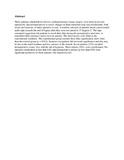| dc.contributor.author | Goldmann, L | |
| dc.contributor.author | Shah, MV | |
| dc.contributor.author | Hebden, MW | |
| dc.date.accessioned | 2013-06-10T14:50:32Z | |
| dc.date.available | 2013-06-10T14:50:32Z | |
| dc.date.issued | 1987 | |
| dc.identifier.citation | Anaesthesia. 1987 Jun;42(6):596-603. | en |
| dc.identifier.uri | www.ncbi.nlm.nih.gov/whalecom0/pubmed/3618993 | |
| dc.identifier.uri | http://erepository.uonbi.ac.ke:8080/xmlui/handle/123456789/31018 | |
| dc.description.abstract | Thirty patients scheduled for elective cardiopulmonary bypass surgery were interviewed pre-operatively and postoperatively to assess changes in their emotional state and recollections, both aware and unaware, of intra-operative events. A random selection of patients heard a prerecorded audio tape towards the end of bypass after they were rewarmed to 37 degrees C. The tape contained suggestions for patients to touch their chin during the postoperative interview, to remember three sentences and to recover quickly. The interviewers were blind to the experimental condition. The experimental group touched their chins significantly more often than the control group (p = 0.015). Sentence recognition did not reach significance and this may be due to the small numbers and low salience of the stimuli. Seven patients (23%) recalled intraoperative events, five with the aid of hypnosis. Three reports (10%) were corroborated. Pre-operative medication (p less than 0.01) and postoperative anxiety (p less than 0.05) were significant predictors of those patients who reported recall. | en |
| dc.language.iso | en | en |
| dc.title | Memory of cardiac anaesthesia. Psychological sequelae in cardiac patients of intra-operative suggestion and operating room conversation. | en |
| dc.type | Article | en |
| local.publisher | Department of Surgery, University of Nairobi | en |

